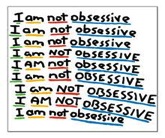Oct. 11 - 17 is OCD Awareness Week
Jill Stoddard
What is OCD?
Image source: http://www.jamesaltucher.com/2012/02/how-to-increase-your-productivity-500/
Have you ever found yourself obsessively worrying about whether you locked your door, turned off your stove, washed your hands well enough, or contaminated or harmed someone else? While it is normal to have concerns in particular situations, individuals afflicted with obsessive compulsive disorder (OCD) experience intrusive, unwanted, distressing thoughts and images that they can’t stop from coming into their minds. In order to cope with the anxiety that is experienced as a result of these obsessions, individuals with OCD often develop behavioral rituals, known as compulsions, such as hand-washing, cleaning, checking, and counting. The compulsions tend to give individuals a feeling of temporary relief from their anxiety. As a result, this relief reinforces the individual to continue performing the rituals. OCD thoughts and rituals can dominate several hours of a person’s day, interfering with work, school, family, and social activities. If left untreated, OCD can worsen over time.
Who Gets OCD?
It is estimated that 1 in 100, or approximately two to three million adults, are currently living with OCD in the United States. An additional 500,000 children and teens in the U.S. are also estimated to suffer from OCD. The exact causes of OCD remain unknown and are thought to be a complex combination of genetics, biology, and environment. Research has indicated that OCD may be triggered in those who are vulnerable (e.g., have a genetic predisposition) by stressful life events, such as a devastating loss or a significant life change. However, research has also suggested that some individuals are more prone to OCD than others. There are specific brain areas that seem to have subtle differences when compared to brain images of those who do not have symptoms of OCD. This may influence one’s ability to cope with stressful situations, as well as one’s likelihood for developing OCD. OCD affects men, women, and children from all races and backgrounds equally.
What is the Most Effective Treatment?
One of the most effective treatments for OCD is cognitive behavioral therapy (CBT), or specifically, Exposure and Response Prevention (ERP). CBT/ERP is a present-centered, skill-based treatment that focuses on systematically reducing obsessions and compulsions and the anxiety associated with them. Certain medications are also beneficial for treating OCD.
When Should I Seek Treatment?
If you or a loved one is experiencing any of the symptoms mentioned and these symptoms are taking up more than an hour per day and/or are interfering with normal functioning, you may want to consider contacting a mental health professional who specializes in Cognitive Behavioral Therapy or medication management for anxiety disorders and OCD.
If you have questions and would like to speak with a professional at The Center for Stress and Anxiety Management, click here.
References
Farrell, L.J. (2011). Treatment outcome in adult OCD: Predictors and processes of change. Asia Pacific Journal of Counselling and Psychotherapy, 2(1), 82-97.
Anxiety Disorders Association of America: www.adaa.org.
